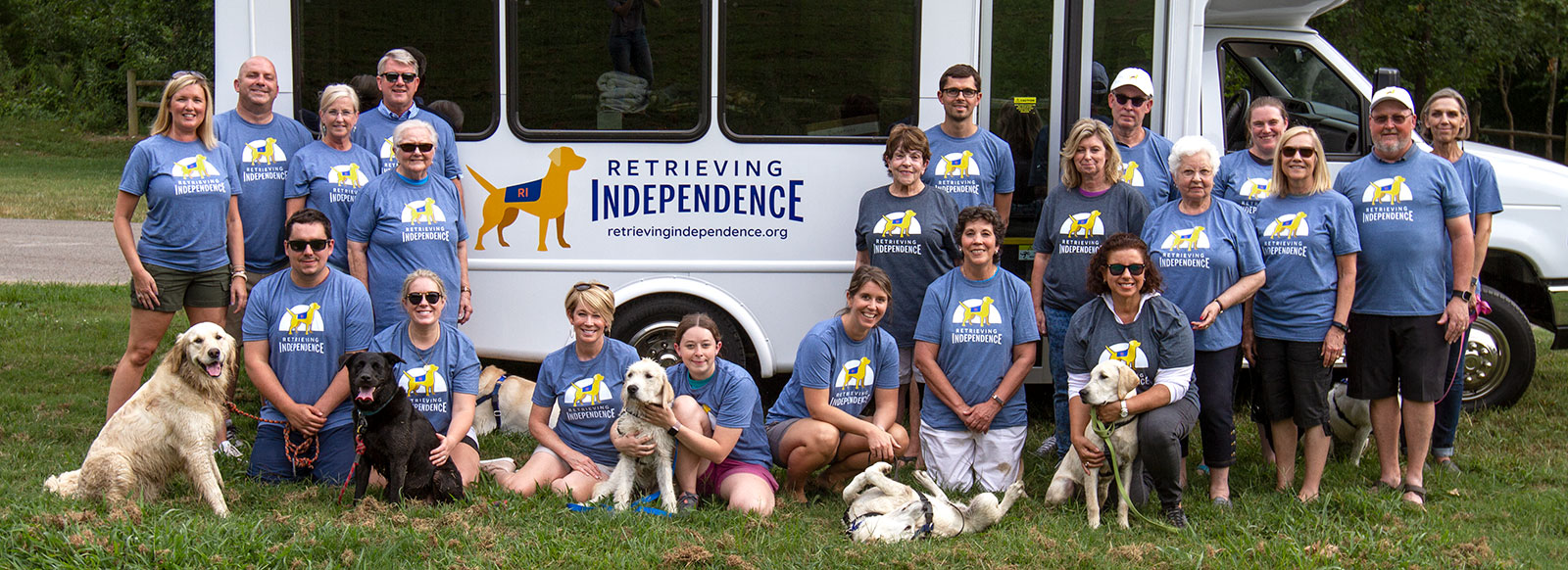
Retrieving Independence volunteers are crucial to all aspects of our work for the successful integration of our dogs into the homes and communities of their future partners.
Our volunteers share a love of dogs and serving others. By becoming a volunteer, you will have the opportunity to change lives one dog at a time.
*Volunteers must reside within a 60 mile radius of Nashville, TN and be over 18 years old.
Upcoming new volunteer dates:
Steps to becoming an RI Volunteer:
1. Complete the application form
2. Upon receipt of your application, you will receive instructions for self-paced onboarding/orientation
3. Once you have completed those steps, you will be approved to work our dogs and, if desired, added to our waitlist for the next available puppies or added to an already existing Puppy Raising Team. Our staff will be in touch to let you know the dates and times of upcoming meetings, and reminders can also be found on our Instagram, @retrievingindependence
We have four types of RI volunteers:
| Puppy Raising Timeline | The Why | The How |
| Puppy Raisers work both independently and jointly via Puppy Raising Teams to care for a Retreiving Independence puppy from the age of 8 weeks through graduation (around 2 years old).
Through our program partnership with the Tennessee Department of Correction, RI provides a high caliber of advance & traditional obedience skills. However, to be successful service dogs, the dogs-in-training require more socialization than they can receive in a prison environment.
Volunteers provide a safe and encouraging home for the puppy and are responsible for “socializing,” toilet training, crate training, exercise and rewarding good behavior. “Socializing” involves taking your puppy everywhere you go throughout your daily routine including work, running errands, out to eat and even on trips. |
This real-world experience exposes your puppy to many sights, sounds and situations as well as handling by kind strangers, friends and family members. During this time, puppies develop confidence, coping skills and resilience required for a successful career as a service dog.
Service dogs must be in a relaxed, happy, working state of mind in distracting environments or potentially stressful situations that many pet dogs would rarely be in, or would not be expected to behave well.
To be able to work in these conditions, dogs must be completely comfortable. The more a puppy has positive experiences with new things during the critical socialization period, the more the dog learns that new things, in general, are not scary or dangerous. |
The comprehensive socialization program—exposure to many new and different environments, people, sounds, and smells—is essential for a proper service dog development. Through this program, the dogs enjoy activities that are not available in prisons such as car rides, movie theaters, parties, festivals, shopping centers, church services, being around babies, sporting events, restaurants and more.
Our Puppy Raising teams provide this socialization by taking out their dog for one week per month to assist with their progress. Puppy Raisers receive information from the trainers about the dog’s recent activities and then keep records so we can assure each puppy receives purposeful exposure to a wide range of experiences.
All Puppy Raisers will have access to other volunteers, our veterinarian or other staff for support or training issues.
Please note: Puppy Raisers are generally on teams so schedules can be accommodated and our puppy sitters are also available for coverage. |
| We provide crates (subject to availability), leash, harness, collar, vest, seatbelt, Kong toy and dog food. | ||
Puppy Sitters support Puppy Raising teams with as-needed coverage (typically a few hours, or an overnight). This is a great way to get started if your availability is limited, or if you don’t want to join a Puppy Raising team just yet.
RI attends community events to share its mission and vision. This is a critical aspect of educating the community about service dogs and how to interact with them, and to recruit new volunteers.
We often hear that the amount of time and activity required for furlough families is more than some volunteers can manage. Please don’t let that keep you from volunteering! We have many other volunteer needs that include, but are not limited to, the following:
- Drivers for Retrieving Independence’s small bus to transport dogs
- Administrative and bookkeeping support
- Photography/media
- Fundraising and Event support
Retrieving Independence also has opportunities for service days to complete large tasks (creating training items, annual bus/van cleaning, or organizing inventory in RI’s storage unit).

